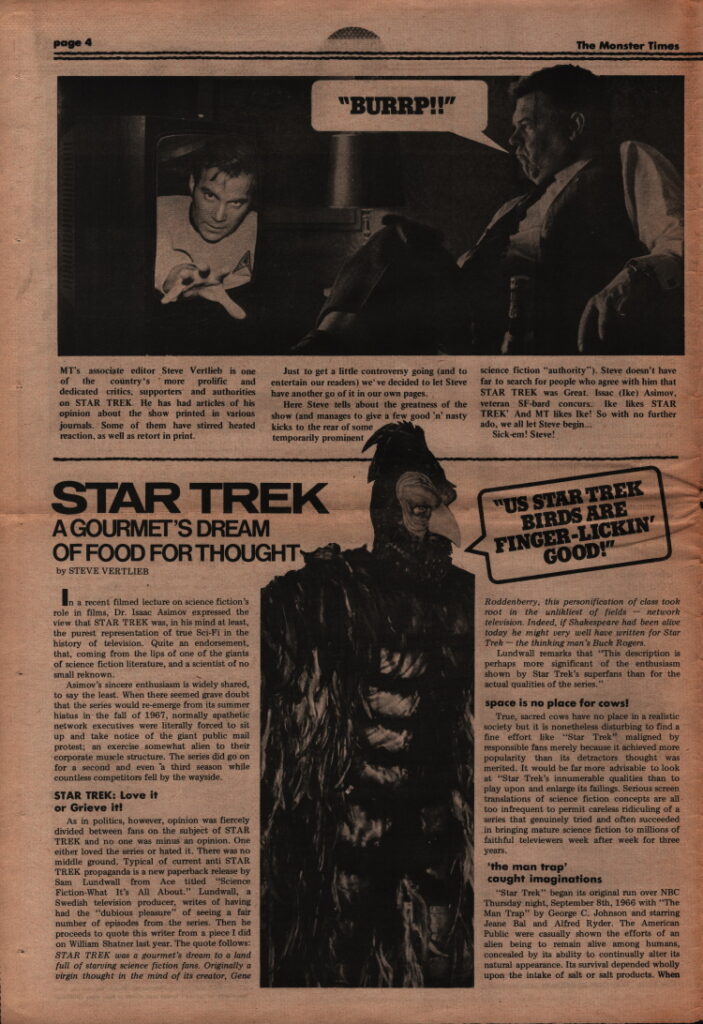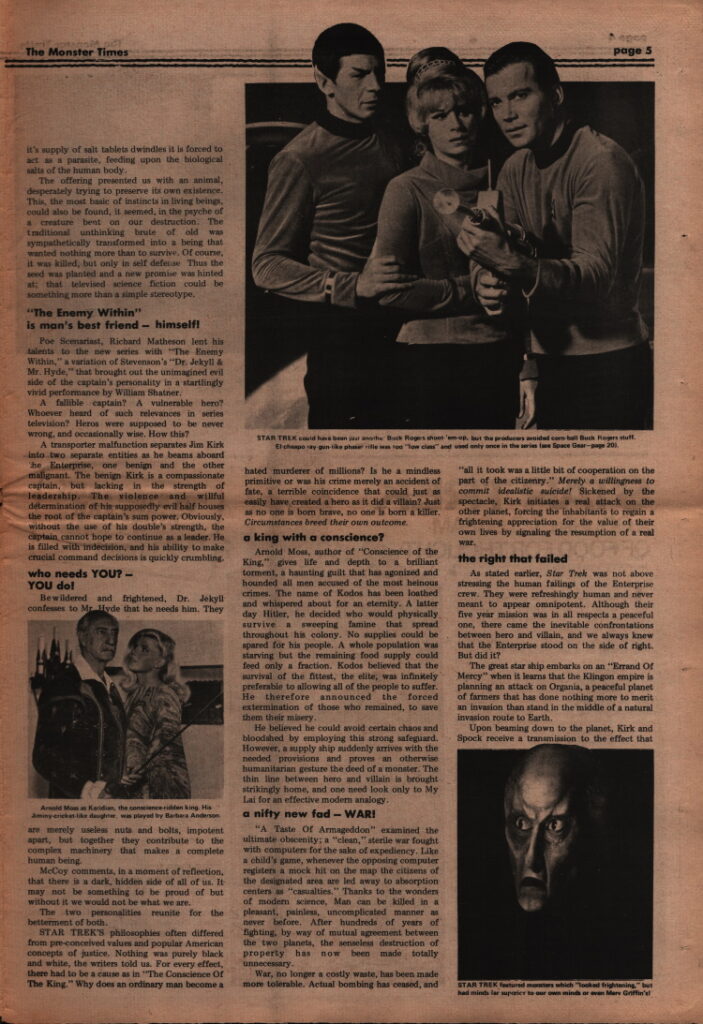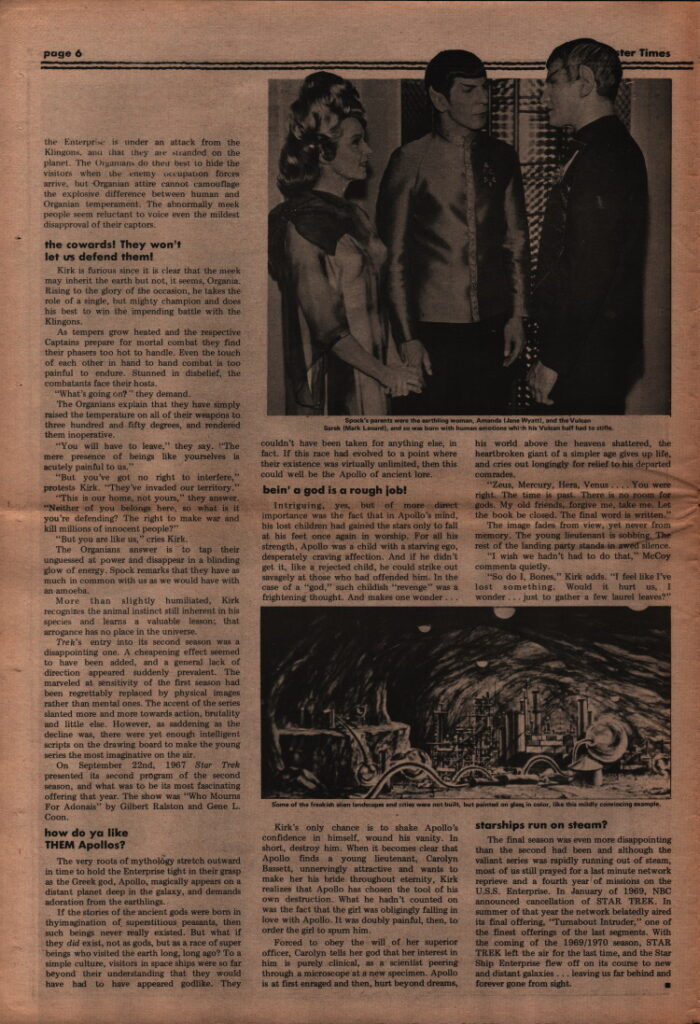
MT’s associate editor Steve Vertlieb is one of the country’s more prolific and dedicated critics, supporters and authorities on STAR TREK. He has had articles of his opinion about the show printed in various journals. Some of them have stirred heated reaction, as well as retort in print.
Just to get a little controversy going (and to entertain our readers) we’ve decided to let Steve have another go of it in our own pages.
Here Steve tells about the greatness of the show (and manages to give a few good ‘n’ nasty kicks to the rear of some temporarily prominent science fiction “authority”). Steve doesn’t have far to search for people who agree with him that STAR TREK was Great. Issac (Ike) Asimov, veteran SF-bard concurs. Ike likes STAR TREK’ And MT likes Ike! So with no further ado, we all let Steve begin…
Sick-em! Steve!
In a recent filmed lecture on science fiction’s role in films, Dr. Isaac Asimov expressed the view that STAR TREK was, in his mind at least, the purest representation of true Sci-Fi in the history of television. Quite an endorsement, that, coming from the lips of one of the giants of science fiction literature, and a scientist of no small renown.
Asimov’s sincere enthusiasm is widely shared, to say the least. When there seemed grave doubt that the series would re-emerge from its summer hiatus in the fall of 1967, normally apathetic network executives were literally forced to sit up and take notice of the giant public mail protest; an exercise somewhat alien to their corporate muscle structure. The series did go on for a second and even a third season while countless competitors fell by the wayside.
STAR TREK: Love it or Grieve it!
As in politics, however, opinion was fiercely divided between fans on the subject of STAR TREK and no one was minus an opinion. One either loved the series or hated it. There was no middle ground. Typical of current anti STAR TREK propaganda is a new paperback release by Sam Lundwall from Ace titled “Science Fiction-What It’s All About.” Lundwall, a Swedish television producer, writes of having had the “dubious pleasure” of seeing a fair number of episodes from the series. Then he proceeds to quote this writer from a piece I did on William Shatner last year. The quote follows: STAR TREK was a gourmet’s dream to a land full of starving science fiction fans. Originally a virgin thought in the mind of its creator, Gene Roddenberry, this personification of class took root in the unlikeliest of fields – network television. Indeed, if Shakespeare had been alive today he might very well have written for Star Trek – the thinking man’s Buck Rogers.
Lundwall remarks that “This description is perhaps more significant of the enthusiasm shown by Star Trek’s superfans than for the actual qualities of the series.”
space is no place for cows!
True, sacred cows have no place in a realistic society but it is nonetheless disturbing to find a fine effort like “Star Trek” maligned by responsible fans merely because it achieved more popularity than its detractors thought was merited. It would be far more advisable to look at “Star Trek’s innumerable qualities than to play upon and enlarge its failings. Serious screen translations of science fiction concepts are all too infrequent to permit careless ridiculing of a series that genuinely tried and often succeeded in bringing mature science fiction to millions of faithful televiewers week after week for three years.
“the man trap’ caught imaginations
“Star Trek” began its original run over NBC Thursday night, September 8th, 1966 with “The Man Trap” by George C. Johnson and starring Jeane Bal and Alfred Ryder. The American Public were casually shown the efforts of an alien being to remain alive among humans, concealed by its ability to continually alter its natural appearance. Its survival depended wholly upon the intake of salt or salt products. When it’s supply of salt tablets dwindles it is forced to act as a parasite, feeding upon the biological salts of the human body.

The offering presented us with an animal, desperately trying to preserve its own existence. This, the most basic of instincts in living beings, could also be found, it seemed, in the psyche of a creature bent on our destruction. The traditional unthinking brute of old was sympathetically transformed into a being that wanted nothing more than to survive. Of course, it was killed, but only in self-defense Thus the seed was planted and a new promise was hinted at; that televised science fiction could be something more than a simple stereotype.
“The Enemy Within” is man’s best friend – himself!
Poe Scenarist, Richard Matheson lent his talents to the new series with “The Enemy Within,” a variation of Stevenson’s “Dr. Jekyll & Mr. Hyde,” that brought out the unimagined evil side of the captain’s personality in a startlingly vivid performance by William Shatner.
A fallible captain? A vulnerable hero? Whoever heard of such relevances in series television? Heros were supposed to be never wrong, and occasionally wise. How this?
A transporter malfunction separates Jim Kirk into two separate entities as he beams aboard the Enterprise, one benign and the other malignant. The benign Kirk is a compassionate captain, but lacking in the strength of leadership. The violence and willful determination of his supposedly evil half houses the root of the captain’s sum power. Obviously, without the use of his double’s strength, the captain cannot hope to continue as a leader. He is filled with indecision, and his ability to make crucial command decisions is quickly crumbling.
who needs YOU? – YOU do!
Bewildered and frightened, Dr. Jekyll confesses to Mr Hyde that he needs him. They are merely useless nuts and bolts, impotent apart, but together they contribute to the complex machinery that makes a complete human being.
McCoy comments, in a moment of reflection, that there is a dark, hidden side of all of us. It may not be something to be proud of but without it we would not be what we are.
The two personalities reunite for the betterment of both.
STAR TREK’S philosophies often differed from pre-conceived values and popular American concepts of justice. Nothing was purely black and white, the writers told us. For every effect, there had to be a cause as in “The Conscience Of The King.” Why does an ordinary man become a hated murderer of millions? Is he a mindless primitive or was his crime merely an accident of fate, a terrible coincidence that could just as easily have created a hero as it did a villain? Just as no one is born brave, no one is born a killer. Circumstances breed their own outcome.
a king with a conscience?
Arnold Moss, author of “Conscience of the King,” gives life and depth to a brilliant torment, a haunting guilt that has agonized and hounded all men accused of the most heinous crimes. The name of Kodos has been loathed and whispered about for an eternity. A latter-day Hitler, he decided who would physically survive a sweeping famine that spread throughout his colony. No supplies could be spared for his people. A whole population was starving but the remaining food supply could feed only a fraction. Kodos believed that the survival of the fittest, the elite, was infinitely preferable to allowing all of the people to suffer. He therefore announced the forced extermination of those who remained, to save them their misery.
He believed he could avoid certain chaos and bloodshed by employing this strong safeguard. However, a supply ship suddenly arrives with the needed provisions and proves an otherwise humanitarian gesture the deed of a monster. The thin line between hero and villain is brought strikingly home, and one need look only to My Lai for an effective modern analogy.
a nifty new fad – WAR!
“A Taste Of Armageddon” examined the ultimate obscenity; a “clean,” sterile war fought with computers for the sake of expediency. Like a child’s game, whenever the opposing computer registers a mock hit on the map the citizens of the designated area are led away to absorption centers as “casualties.” Thanks to the wonders of modern science, Man can be killed in a pleasant, painless, uncomplicated manner as never before. After hundreds of years of fighting, by way of mutual agreement between the two planets, the senseless destruction of property has now been made totally unnecessary.
War, no longer a costly waste, has been made more tolerable. Actual bombing has ceased, and “all it took was a little bit of cooperation on the part of the citizenry.” Merely a willingness to commit idealistic suicide! Sickened by the spectacle, Kirk initiates a real attack on the other planet, forcing the inhabitants to regain a frightening appreciation for the value of their own lives by signaling the resumption of a real war.
the right that failed
As stated earlier, Star Trek was not above stressing the human failings of the Enterprise crew. They were refreshingly human and never meant to appear omnipotent. Although their five-year mission was in all respects a peaceful one, there came the inevitable confrontations between hero and villain, and we always knew that the Enterprise stood on the side of right. But did it?
The great starship embarks on an “Errand Of Mercy” when it learns that the Klingon empire is planning an attack on Organia, a peaceful planet of farmers that has done nothing more to merit an invasion than stand in the middle of a natural invasion route to Earth.
Upon beaming down to the planet, Kirk and Spock receive a transmission to the effect that the Enterprise is under an attack from the Klingons, and that they are stranded on the planet. The Organians do their best to hide the visitors when the enemy occupation forces arrive, but Organian attire cannot camouflage the explosive difference between human and Organian temperament. The abnormally meek people seem reluctant to voice even the mildest disapproval of their captors.

the cowards! They won’t let us defend them!
Kirk is furious since it is clear that the meek may inherit the earth but not, it seems, Organia. Rising to the glory of the occasion, he takes the role of a single, but mighty champion and does his best to win the impending battle with the Klingons.
As tempers grow heated and the respective Captains prepare for mortal combat they find their phasers too hot to handle. Even the touch of each other in hand to hand combat is too painful to endure. Stunned in disbelief, the combatants face their hosts.
“What’s going on?” they demand.
The Organians explain that they have simply raised the temperature on all of their weapons to three hundred and fifty degrees, and rendered them inoperative.
“You will have to leave,” they say. “The mere presence of beings like yourselves is acutely painful to us.”
“But you’ve got no right to interfere,” protests Kirk. “They’ve invaded our territory.”
“This is our home, not yours,” they answer. “Neither of you belongs here, so what is it you’re defending? The right to make war and kill millions of innocent people?”
“But you are like us,” cries Kirk.
The Organians answer is to tap their unguessed at power and disappear in a blinding glow of energy. Spock remarks that they have as much in common with us as we would have with an amoeba.
More than slightly humiliated, Kirk recognizes the animal instinct still inherent in his species and learns a valuable lesson; that arrogance has no place in the universe.
Trek’s entry into its second season was a disappointing one. A cheapening effect seemed to have been added, and a general lack of direction appeared suddenly prevalent. The marveled at sensitivity of the first season had been regrettably replaced by physical images rather than mental ones. The accent of the series slanted more and more towards action, brutality and little else. However, as saddening as the decline was, there were yet enough intelligent scripts on the drawing board to make the young series the most imaginative on the air.
On September 22nd, 1967 Star Trek presented its second program of the second season, and what was to be its most fascinating offering that year. The show was “Who Mourns For Adonais” by Gilbert Ralston and Gene L. Coon.
how do ya like THEM Apollos?
The very roots of mythology stretch outward in time to hold the Enterprise tight in their grasp as the Greek god, Apollo, magically appears on a distant planet deep in the galaxy, and demands adoration from the earthlings.
If the stories of the ancient gods were born in thy imagination of superstitious peasants, then such beings never really existed. But what if they did exist, not as gods, but as a race of super-beings who visited the earth long, long ago? To a simple culture, visitors in spaceships were so far beyond their understanding that they would have had to have appeared godlike. They couldn’t have been taken for anything else, in fact. If this race had evolved to a point where their existence was virtually unlimited, then this could well be the Apollo of ancient lore.
bein’ a god is a rough job!
Intriguing, yes, but of more direct importance was the fact that in Apollo’s mind, his lost children had gained the stars only to fall at his feet once again in worship. For all his strength, Apollo was a child with a starving ego, desperately craving affection. And if he didn’t get it, like a rejected child, he could strike out savagely at those who had offended him. In the case of a “god,” such childish “revenge” was a frightening thought. And makes one wonder…
Kirk’s only chance is to shake Apollo’s confidence in himself, wound his vanity. In short, destroy him. When it becomes clear that Apollo finds a young lieutenant, Carolyn Bassett, unnervingly attractive and wants to make her his bride throughout eternity, Kirk realizes that Apollo has chosen the tool of his own destruction. What he hadn’t counted on was the fact that the girl was obligingly falling in love with Apollo. It was doubly painful, then, to order the girl to spurn him.
Forced to obey the will of her superior officer, Carolyn tells her god that her interest in him is purely clinical, as a scientist peering through a microscope at a new specimen. Apollo is at first enraged and then, hurt beyond dreams, his world above the heavens shattered, the heartbroken giant of a simpler age gives up life, and cries out longingly for relief to his departed comrades.
“Zeus, Mercury, Hera, Venus …. You were right. The time is past. There is no room for gods. My old friends, forgive me, take me. Let the book be closed. The final word is written.”
The image fades from view, yet never from memory. The young lieutenant is sobbing. The rest of the landing party stands in awed silence.
“I wish we hadn’t had to do that,” McCoy comments quietly.
“So do I, Bones,” Kirk adds. “I feel like I’ve lost something. Would it hurt us, I wonder … just to gather a few laurel leaves?”
starships run on steam?
The final season was even more disappointing than the second had been and although the valiant series was rapidly running out of steam, most of us still prayed for a last-minute network reprieve and a fourth year of missions on the U.S.S. Enterprise. In January of 1969, NBC announced cancellation of STAR TREK. In summer of that year the network belatedly aired its final offering, “Turnabout Intruder,” one of the finest offerings of the last segments. With the coming of the 1969/1970 season, STAR TREK left the air for the last time, and the Star Ship Enterprise flew off on its course to new and distant galaxies … leaving us far behind and forever gone from sight.
